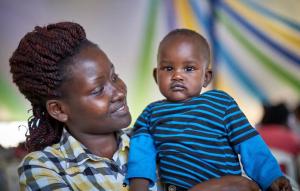Malaria vaccine pilot in Africa one year on: new vaccine could boost Kenya’s malaria fight
Nairobi – Oblivious to the auspicious occasion, a bundle of children winced and gasped as they received their vaccinations. But in that moment, as they clung even tighter to their mothers, they became Kenya’s first children to receive the malaria vaccine through a historic pilot introduction programme initiated in Africa one year ago. Today, on this World Malaria Day, about 82 000[1] Kenyan children in pilot areas have received their first dose of the vaccine and are benefiting from the added protection against malaria.
Update on the malaria vaccine pilot programme: one year on
In September 2019 the Ministry of Health launched the malaria vaccine in Ndhiwa, Homabay County, one of the eight counties in western Kenya with the heaviest burden of malaria nationwide. Local officials welcomed the new tool, noting that the 40% additional reduction in malaria cases achieved through vaccination, on top of protection provided by bednets, would be a welcome contribution to improve health and reduce burden on health facilities. The start of malaria vaccination in selected areas of the seven other counties in the region soon followed.
Ghana, Kenya and Malawi launched the malaria vaccine in childhood vaccination in selected areas of high malaria transmission in 2019. Malawi was the first to do so in April, followed by Ghana, and then by Kenya. Around 275 000 children have received the first dose of the RTS,S vaccine across the three countries so far.
Under-five children are most vulnerable to the malaria disease, and in 2018 this age group accounted for 67% of malaria deaths globally. The bulk of malaria deaths in the world are in sub-Saharan Africa. In Kenya 70% of the population is at risk of malaria and it remains a major killer of children.
For many parents who witnessed the rare occasion in Ndhiwa and in the other counties, the potential of the vaccine to reduce malaria in children brought solace. The threat of deadly malaria is constant for young children in the area.
The RTS,S vaccine is administered in four doses starting from age six months. The vaccine is complementary to other proven measures to fight malaria and, if recommended for wider use, has the potential to save tens of thousands of young lives in Africa.
Elian, a young boy who recently celebrated his first birthday, has so far received three doses of the vaccine. “When your child is healthy, everything else seems to fall into place,” said Elian’s mother recently.
Learning more about this prevention tool
Evidence and experience from the vaccine pilot will inform recommendations on the broader use of the vaccine. The pilot programme will generate important information on how best to reach children with the four doses of vaccine, the reduction in illness and death that can be achieved, and vaccine safety in routine use. This information will inform the future use of the vaccine in Kenya, Ghana, Malawi, and across Africa.
“The malaria vaccine introduction and programme will help us learn more about the potential of this prevention tool to change the trajectory of malaria – a disease that has held Kenya and Africa in its grips for ages,” said WHO Representative Dr Rudi Eggers at the initial launch.
As Dr Eggers explained, the 30-year work done towards achieving a vaccine, “represents a dream come true for many people - scientists, public health experts and leaders, health care workers, community advocates, public and private partners, and the people, children and families who have suffered from the disease.”
Essential malaria and immunization services, as COVID-19 evolves
The malaria vaccine is being introduced in areas where children are at high risk of illness and death from malaria. In these areas as much as 60% of childhood outpatient health facility visits are due to malaria. The RTS,S vaccine can reduce cases of malaria and severe malaria, hospital admissions and blood transfusions – it is expected to decrease child deaths and relieve health systems.
Today, in the context of the COVID-19 pandemic, Dr Eggers applauds the commitment of the Government of Kenya, the Ministry of Health and the health leaders, doctors, nurses and community health volunteers who continue to deliver essential malaria control and immunization services to protect the health of the population in ways that minimize any health risks to health workers and communities.
[1] Estimated cumulative number of children who received their first dose of malaria vaccine, from pilot launch and projected to April 2020.
Communications & Social Mobilisation
Tel: +254 722509403
Cell: +254 710 149489
Email: mwakishaj [at] who.int
Communications and marketing officer
Tel: + 242 06 520 65 65 (WhatsApp)
Email: boakyeagyemangc [at] who.int
Senior Editor/Writer
Email: ottob [at] who.int



